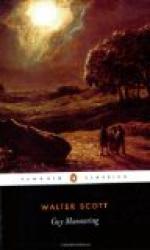’I have thought upon it, Matilda, till my head is almost giddy; nor can I conceive a better plan than to make a full confession to my father. He deserves it, for his kindness is unceasing; and I think I have observed in his character, since I have studied it more nearly, that his harsher feelings are chiefly excited where he suspects deceit or imposition; and in that respect, perhaps, his character was formerly misunderstood by one who was dear to him. He has, too, a tinge of romance in his disposition; and I have seen the narrative of a generous action, a trait of heroism, or virtuous self-denial, extract tears from him which refused to flow at a tale of mere distress. But then Brown urges that he is personally hostile to him. And the obscurity of his birth, that would be indeed a stumbling-block. O, Matilda, I hope none of your ancestors ever fought at Poictiers or Agincourt! If it were not for the veneration which my father attaches to the memory of old Sir Miles Mannering, I should make out my explanation with half the tremor which must now attend it.’
SEVENTH EXTRACT
’I have this instant received your letter—your most welcome letter! Thanks, my dearest friend, for your sympathy and your counsels; I can only repay them with unbounded confidence.
’You ask me what Brown is by origin, that his descent should be so unpleasing to my father. His story is shortly told. He is of Scottish extraction, but, being left an orphan, his education was undertaken by a family of relations settled in Holland. He was bred to commerce, and sent very early to one of our settlements in the East, where his guardian had a correspondent. But this correspondent was dead when he arrived in India, and he had no other resource than to offer himself as a clerk to a counting-house. The breaking out of the war, and the straits to which we were at first reduced, threw the army open to all young men who were disposed to embrace that mode of life; and Brown, whose genius had a strong military tendency, was the first to leave what might have been the road to wealth, and to choose that of fame. The rest of his history is well known to you; but conceive the irritation of my father, who despises commerce (though, by the way, the best part of his property was made in that honourable profession by my great-uncle), and has a particular antipathy to the Dutch—think with what ear he would be likely to receive proposals for his only child from Vanbeest Brown, educated for charity by the house of Vanbeest and Vanbruggen! O, Matilda, it will never do; nay, so childish am I, I hardly can help sympathising with his aristocratic feelings. Mrs. Vanbeest Brown! The name has little to recommend it, to be sure. What children we are!’




